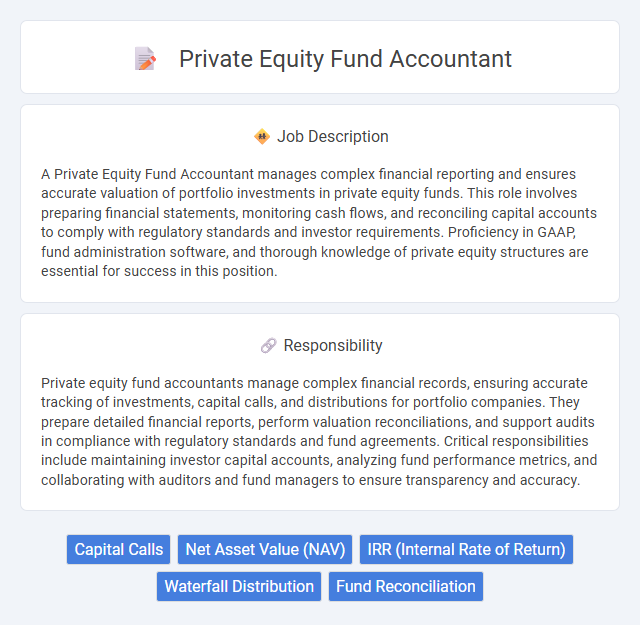
A Private Equity Fund Accountant manages complex financial reporting and ensures accurate valuation of portfolio investments in private equity funds. This role involves preparing financial statements, monitoring cash flows, and reconciling capital accounts to comply with regulatory standards and investor requirements. Proficiency in GAAP, fund administration software, and thorough knowledge of private equity structures are essential for success in this position.
Individuals with strong analytical skills and a keen attention to detail are likely to thrive as private equity fund accountants, given the complex financial data and reporting requirements involved. Those who prefer structured environments and enjoy working with numbers in a fast-paced setting may find this role suitable. Conversely, people who struggle with deadlines or lack interest in financial regulations might encounter challenges in adapting to this job.
Qualification
A Private Equity Fund Accountant typically requires a bachelor's degree in accounting, finance, or a related field, accompanied by professional certifications such as CPA or CFA to enhance credibility. Expertise in GAAP, NAV calculations, fund administration, and investor reporting is essential for accurate financial management. Strong analytical skills, proficiency in accounting software like QuickBooks or Investran, and experience with complex fund structures enable effective portfolio valuation and compliance.
Responsibility
Private equity fund accountants manage complex financial records, ensuring accurate tracking of investments, capital calls, and distributions for portfolio companies. They prepare detailed financial reports, perform valuation reconciliations, and support audits in compliance with regulatory standards and fund agreements. Critical responsibilities include maintaining investor capital accounts, analyzing fund performance metrics, and collaborating with auditors and fund managers to ensure transparency and accuracy.
Benefit
A Private Equity Fund Accountant likely enjoys competitive compensation packages due to the specialized nature of the role. Job benefits may include exposure to complex financial transactions, enhancing professional skills and career growth potential. Access to industry networks and potential bonuses tied to fund performance could further incentivize this career path.
Challenge
The role of a private equity fund accountant likely involves navigating complex financial reporting and regulatory compliance requirements. Managing diverse investment portfolios might demand precise valuation and reconciliations under tight deadlines. Handling these challenges probably requires strong analytical skills and meticulous attention to detail.
Career Advancement
Private equity fund accountants play a critical role in managing complex financial reporting, investor communications, and compliance within private equity firms, providing a strong foundation for career advancement. Mastery of fund accounting principles, regulatory standards, and proficiency with specialized software such as Investran or eFront can accelerate progression to senior accounting and finance roles. Opportunities for growth often lead to positions like fund controller, financial reporting manager, or CFO, with the potential to transition into portfolio management or private equity operations.
Key Terms
Capital Calls
A private equity fund accountant manages capital calls by accurately tracking investor commitments and ensuring timely notifications for required contributions. They reconcile capital call transactions, monitor cash flow, and maintain detailed records to support fund audits and financial reporting. Expertise in capital call schedules and investor communication is essential for efficient fund management and compliance.
Net Asset Value (NAV)
A Private Equity Fund Accountant specializes in calculating and verifying the Net Asset Value (NAV) of investment funds, ensuring accurate valuation of portfolio assets and liabilities. This role involves detailed reconciliation of financial statements, monitoring capital calls and distributions, and supporting audit processes to maintain compliance with industry regulations. Expertise in fund accounting software and strong understanding of complex financial instruments are essential for precise NAV reporting and investor transparency.
IRR (Internal Rate of Return)
A Private Equity Fund Accountant plays a crucial role in calculating and analyzing the Internal Rate of Return (IRR) to measure the performance of investment portfolios accurately. This involves tracking cash flows, managing capital calls, distributions, and valuations to ensure precise IRR computation that reflects the fund's profitability over time. Expertise in fund accounting software and rigorous data reconciliation is essential for delivering detailed financial reports that inform investor decisions.
Waterfall Distribution
A Private Equity Fund Accountant specializes in managing and accurately calculating Waterfall Distributions, ensuring proper allocation of profits between limited partners and general partners according to the fund's preferred return and carried interest structures. This role involves detailed tracking of capital calls, distributions, and hurdle rates to maintain compliance with fund agreements and support transparent investor reporting. Proficiency in complex financial modeling and fund accounting software is essential to optimize the accuracy and efficiency of cash flow waterfalls in private equity fund management.
Fund Reconciliation
A Private Equity Fund Accountant specializes in fund reconciliation by ensuring accurate matching of capital calls, distributions, and investment valuations across multiple investor accounts. Expertise in reconciling complex cash flows and schedules is critical to maintaining precise financial records and compliance with regulatory standards. Proficiency in accounting software such as Investran and eFront enhances efficiency in managing portfolio accounting and reporting requirements.
 kuljobs.com
kuljobs.com